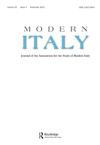The Italian historiographical debate and the Fact Checkers movement
IF 0.4
3区 历史学
Q3 AREA STUDIES
引用次数: 0
Abstract
Abstract The ‘Fact Checking’ series of titles published by Laterza since 2020 is, in the first place, a response to the proliferation of historical fake news, which has grown exponentially as a consequence of social networks. But it is also a response to an increasingly systematic political abuse of history – not only in Italy. The authors and the public firmly believe in the necessity of restoring complexity and value to historical research, as well as in the importance of playing a significant role in the public debate about our past. In many ways the political use of history works in an authoritarian and anti-democratic manner, spreading erroneous and dangerous convictions among broad sections of society. Among the examples which appear in various sections of the article, we discuss the books in the series which problematise the ‘official’ and victimist version of events which took place on the Italian-Yugoslavian border at the end of the Second World War. Other parts of the article examine the instrumental readings of the history and experience of twentieth-century communism.意大利史学辩论和事实核查运动
自2020年以来,Laterza出版的“事实核查”系列图书首先是对历史上假新闻泛滥的回应,假新闻由于社交网络而呈指数级增长。但这也是对日益系统化的政治滥用历史的回应——不仅是在意大利。作者和公众坚定地相信,恢复历史研究的复杂性和价值的必要性,以及在关于我们过去的公共辩论中发挥重要作用的重要性。在许多方面,对历史的政治利用以专制和反民主的方式起作用,在社会的广大阶层中传播错误和危险的信念。在文章各部分出现的例子中,我们讨论了一系列书,这些书对第二次世界大战结束时发生在意大利-南斯拉夫边境的事件的“官方”和受害者版本提出了问题。文章的其他部分考察了对20世纪共产主义历史和经验的工具性解读。
本文章由计算机程序翻译,如有差异,请以英文原文为准。
求助全文
约1分钟内获得全文
求助全文

 求助内容:
求助内容: 应助结果提醒方式:
应助结果提醒方式:


